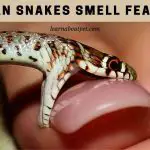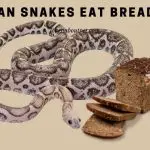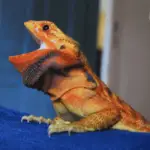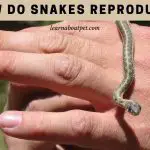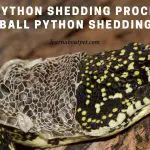Sometimes, you may see a snake open its mouth wide, then close it slowly after a few seconds in a manner similar to yawning. This can get you wondering whether snakes yawn, and if yes, why they do it. This article has the answers.
Do snakes yawn? The answer is ‘yes’. Snakes do yawn. It is usually a sign that the snake is ready for a meal/hungry. Or if it is after eating, it can be a way of the snake realigning its jaws. But the ‘yawning’ can also be in a bid to pick chemical cues from the surroundings. And a snake yawning way too often may be due to illness.
It is important to mention that the yawning that snakes do is quite different from the yawning that we, as human beings, do.
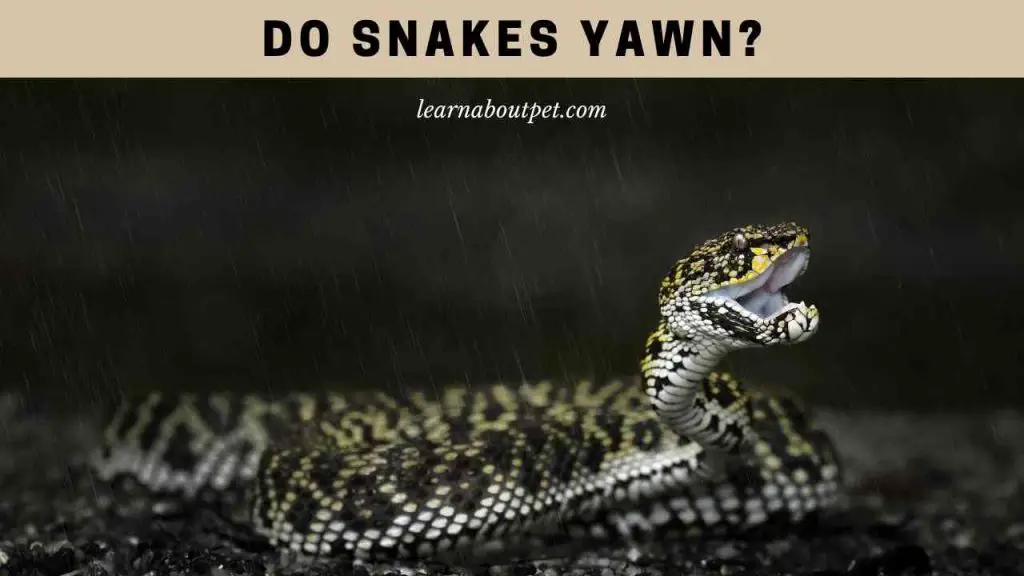
A better term for it would actually be ‘mouth gaping’. While doing it, you will usually see the snake mouth open wide in a somewhat slow manner. Then, after a short while, the snake will close its mouth, again in a somewhat slow manner.
Whereas yawning in us humans tends to be largely involuntary, the snake yawning seems to be voluntary.
It is also apparently for reasons that are very different from human yawning, as we shall see shortly.
Can Snakes Yawn?
Before proceeding to answer the do snakes yawn question, it would be a good idea to find out whether, in the first place, snakes can really yawn.
So, can snakes yawn? Do snakes really yawn? The answer is ‘yes’ – but with a disclaimer that the yawning snakes do is quite different from human yawning.
When people refer to it as ‘yawning’ it is because that is the closest descriptive term for the phenomenon. But purists would be more inclined to refer to it as ‘mouth gaping’, rather than ‘yawning’.
While in its presence, you may see a snake open its mouth wide, then slowly close it shortly thereafter. That happens in a manner we can only refer to as ‘yawning’.
It is on this basis then that we assert that snakes can ‘yawn’.
How Do Snakes Yawn?
The yawning process in snakes can be visualized as having three key stages.
In the first stage, the snake opens its mouth slowly. Therefore here, you will normally see snake mouth open wide and usually in a somewhat slow manner.
In the second stage, the snake will keep its mouth open for some seconds. These are seconds in which you have snakes mouth open wide.
And in the third stage, the snake will close its mouth, in a slow manner.
This is, in many ways, akin to how we (humans) yawn: by slowly opening our mouths, keeping them open for some seconds, then closing them quite slowly.
How Often Do Snakes Yawn?
The frequency of ‘yawning’ will vary from snake to snake. There are snakes that only yawn once in a long while. You may actually go for weeks or even months without ever seeing certain snakes yawning.
Then there are snakes that yawn very frequently. In fact, there are snakes you will catch yawning every day.
The yawning frequency may also depend on snake species. For instance, when you research on how often do corn snakes yawn, you will notice that it is different from how often pythons yawn.
As we shall see later, where a snake yawns far too often, it can signify certain underlying problems.
Why Do Snakes Yawn?
Firstly, snakes yawn while getting ready to eat. You have to remember that snakes’ eating entails swallowing their food whole. They don’t chew their food.
Further, you need to remember that snakes often have to eat (swallow whole) things that are wider than their heads.
This is what necessitates the yawning, when getting ready for a meal.
The inference is this: if you see your snake yawning, it may mean that it wants to be fed.
Secondly, snakes yawn right after eating, to realign their jaws. True, because their lower jaws are separate from their upper jaws, they don’t really dislocate, even when a snake swallows a supersize meal.
But the jaws do move out of their normal position. So the yawning helps in realigning them.
Thirdly, snakes may yawn when they want to collect chemical cues from their surroundings. When a snake yawns, an organ (inside the snake) referred to as the Jacobson organ makes contact with the tongue.
Consequently, cues collected from the environment get in. These may, for instance, be cues on what types of prey are close by.
Fourthly, snakes may yawn when they are ill. Certain respiratory diseases, for instance, may make snakes tend to yawn very frequently. Mouth rot is also speculated to be capable of making snakes yawn frequently.
This, therefore, is the answer to the y do snakes yawn (or why does snakes yawn) question.
And it applies for all types of snakes. For instance, even if you were to research on why do ball pythons yawn or why do corn snakes yawn (or any other type of snake), this is the sort of answer you would keep on getting.
Do Snakes Yawn Randomly?
For the most part, snakes don’t seem to yawn randomly. On the contrary, when snakes yawn, it tends to be a voluntary, deliberate action.
As we saw earlier, a snake may yawn when getting ready to eat, or right after eating. A snake may also yawn to pick chemical cues from its surroundings.
All these would be deliberate rather than random acts.
The only time when a snake may be yawning randomly is if it is due to some illness. For instance, a snake with a disease like mouth rot may yawn randomly.
Therefore if, for instance, you find your corn snake yawning or if you find your ball python opening mouth in a yawning pose, don’t assume that it is a random act.
Is It Bad If A Snake Yawns?
If your snake only yawns once in a while (like when getting ready to eat or after eating to realign its jaws), then it is really not bad.
But if your snake keeps on yawning, it may be bad. It may, for instance, be as a result of diseases such as mouth rot.
The only way to be sure that it is due to such diseases is by checking what other symptoms accompany the yawning.
Take, for instance, the case of a snake that is yawning frequently, and is also tending to rub or scratch its mouth on objects. Such a snake may indeed be suffering from mouth rot.
Where a snake keeps on yawning frequently, but it is due to the need to pick chemical cues from its surroundings, then this too wouldn’t be bad.
Is It Normal For A Snake To Yawn?
The people who pose the do snakes yawn question may also have an interest in knowing whether it is normal for a snake to yawn.
For instance, if one has seen a ball python yawning, they may ask, is it normal for a ball python to yawn?
Or if one finds their corn snake mouth open in a yawning pose, they may ask, is it normal for corn snakes to yawn?
The true position is that it is normal for a snake to yawn.
A snake may yawn in readiness to eat. It may also yawn after eating, to realign its jaw. And it may yawn in a bid to pick chemical cues from its environment.
All these are normal things in a snake.
The only scenario where snake yawning may be problematic is if it is due to illness. For instance, where there is frequent yawning, and it seems to be due to mouth rot, then that can be problematic.

What Does It Mean If My Snake Yawns?
This is effectively another way of putting the why do snakes yawn question.
Now if your snake yawns, it may mean that it wants to be fed. Or, in other words, that it is getting ready for a meal.
Further, if your snake yawns just after eating, it may mean that it is realigning its jaws.
Further still, your snake may be yawning in a bid to pick chemical cues from its surroundings. So when it yawns, its Jacobson’s organ presses on its tongue, making it possible for the snake to pick the chemical cues from its surroundings.
At yet another level, if your snake yawns too frequently, it may be a sign that it is ill. It may be suffering from mouth rot or from some respiratory disease.
These are the applicable possibilities, regardless of the type of snake you have.
Therefore even if, for instance, you were to ask, why is my ball python yawning (or why do ball pythons yawn in general), these would be the key possibilities.
And they would also be the possibilities in the case of a corn snake, cobra or any other type of snake yawning.
Do Snakes Yawn When Stressed?
There is really no evidence to suggest that snakes yawn when under stress.
True, when you go through most of the why do snakes yawn Reddit threads, you will encounter suggestions that stress can cause snakes to yawn.
But there is no evidence to back this.
You may even frame the question as, do snakes yawn when tired? And the answer would be the same: that there is no evidence to support that speculation.
Yet the why do snakes yawn ball python owners usually expect is along these lines. Many seem to expect it to be due to stress.
That is because when someone sees a python snake open mouth in a yawning pose, the first instinct is to suspect that it is due to stress.
But whereas human yawning is often due to stress, there is absolutely no evidence to suggest that snakes too yawn due to stress.
Do Snakes Yawn When They’re Hungry?
Snakes do yawn when they are hungry. In this context, the yawning may be viewed as a way of preparing their mouths/jaws to swallow whatever prey will be coming their way.
Therefore it is accurate to say that snakes do yawn when they are hungry.
And the answer to the do snakes yawn when they’re hungry question is in the affirmative.
Yet there are people who also observe that their snakes yawn after eating. So they find the whole thing conflicting: where you have snakes yawning because they are hungry and where you have snakes yawning right after eating.
This leads to the question: why do snakes yawn after eating?
And the answer is that they yawn after eating in order to realign their jaws.
So there is really no conflicting information. When they are hungry, they yawn to prepare their jaws for swallowing their meal. And after eating, they may yawn to realign their jaws.
Therefore if, for instance, you find your python mouth open before or after eating, this would be the explanation.
Why Does My Snake Keep Yawning?
Where your snake keeps on yawning, one possibility may be that it is hungry. It may not be getting enough food. So it may always be in hungry mode, hence its tendency to keep on yawning.
Further, where your snake keeps on yawning, it may be an indication that it is ill. The problem may be mouth rot, some respiratory disease and so on.
But you could also be having a case where the snake keeps yawning in search of chemical cues from its surroundings.
Those too would be the possible answers to the why do snakes yawn a lot question. In other words, if your snake yawns a lot/keeps on yawning, these are the likely reasons.
Final Verdict – Do Snakes Yawn
Snakes do yawn. Or at least, snakes do open their mouths, keep them open for some seconds and then close them – in a manner that qualifies to be termed as ‘yawning’. Other people may prefer to call it ‘mouth gaping’.
The reasons for snakes yawning may include hunger/getting ready to eat, realigning their jaws after eating and picking chemical cues from their surroundings.
There are also cases where snakes that are ill (including those with mouth rot and various respiratory conditions) may start yawning often.

If your snake only yawns once in a while, probably in readiness to eat or after eating, that is normal.
But if your snake keeps on yawning too frequently, you may need to consider any underlying problems. The snake may be having mouth rot or some other respiratory disease that requires treatment.
As a pet lover, make sure to learn about pet more and give your pet snake a good and comfortable life!

Welcome to Learn About Pet. My name is Rajkumar Ravichandran and I love all pets, travel, and amazing food. I write about my passion and personal experience caring for multiple pets in this blog! ❤️
Post Disclaimer
DISCLAIMER: THIS BLOG OR WEBSITE, "Learn About Pet", DOES NOT PROVIDE YOU WITH MEDICAL ADVICE AND IS NOT A SUBSTITUTE FOR MEDICAL ADVICE. ALWAYS GET IN TOUCH WITH YOUR PERSONAL VETERINARIAN AND USE INFORMATION HERE AS GENERAL ADVICE.
The information, including but not limited to, text, graphics, images and other material contained on this website are for informational purposes only. No material on this site is intended to be a substitute for professional veterinary advice, food recommendation, diagnosis, or treatment. Always seek the advice of your veterinarian or other qualified health care provider with any questions you may have regarding a medical condition or for pet food related questions.


